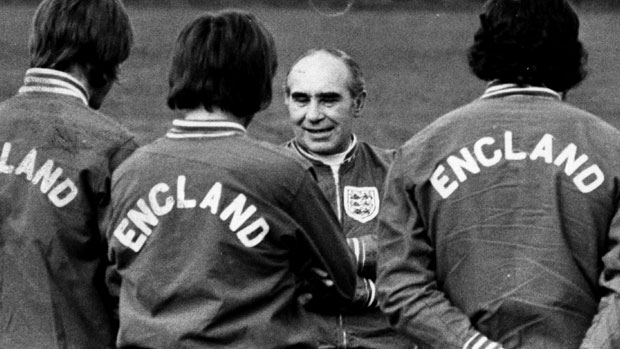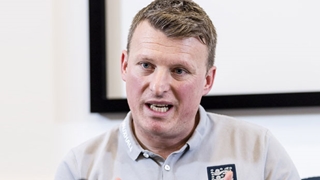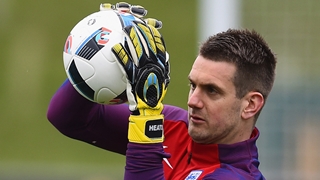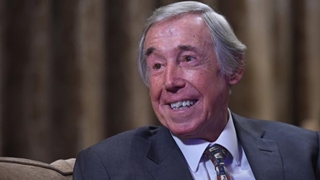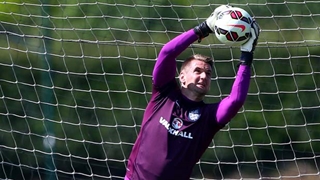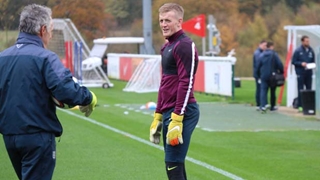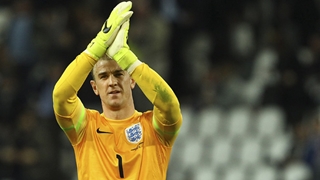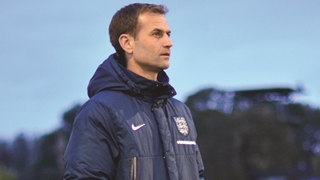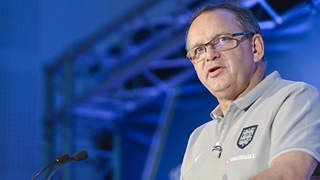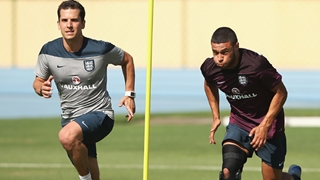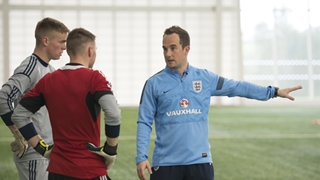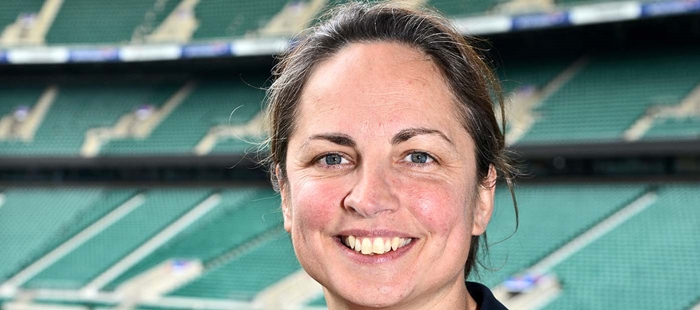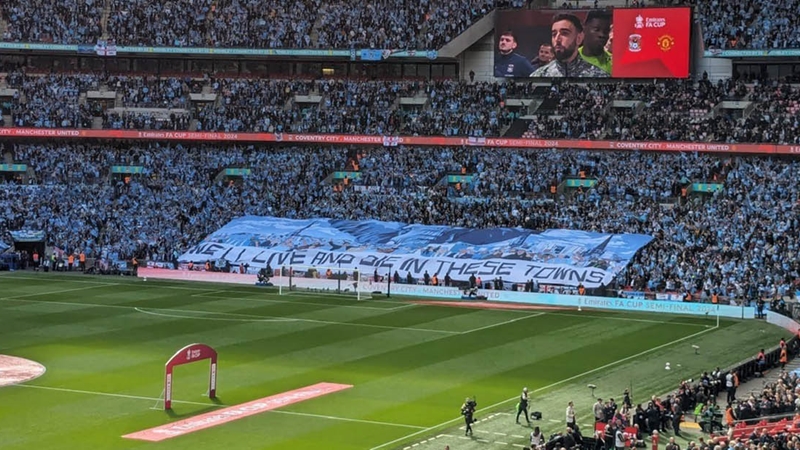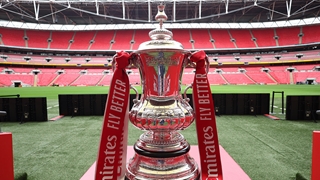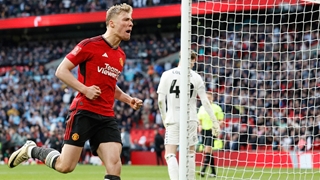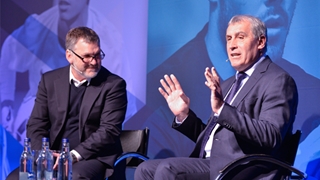
If you were to list the ingredients of an elite environment fit to produce England’s next international goalkeeper you probably wouldn’t find a car park, a greengrocer's wall and a couple of jackets as goalposts noted.
However, a 10 year-old Peter Shilton took every opportunity to hone the skills that would provide the foundation of a remarkable career which brought a record number of England appearances (125), two European Cups and a First Division title amongst a whole other collection of silverware.
"I joined Leicester when I was 10 – I shouldn’t really have been allowed to do it. They said if you come straight from school we’ll give you an hour and half’s coaching every Tuesday and Thursday with the third-team trainer," explained Shilton.
"I used to train on a car park outside of Filbert Street [Leicester City’s old ground]. I used to get padded up because it was concrete and sometimes at the end of the season I was allowed to go onto the pitch. Can you imagine a 10 or 11 year old going onto Filbert street?" he adds with a smile.
"As I got older I used to stay with the amateurs and semi-professionals and it toughened me up quite a bit because they’re big lads, and that was really the start before I signed when I was 15," added the 66-year-old, who was speaking at The FA’s 2016 Goalkeeping conference, which saw over 500 coaches attend St George’s Park for the two-day annual event.
Between his twice-weekly trips to Leicester City’s car park, the future England captain was obsessive in his commitment to developing his craft.
"I used to go straight on the park after school with a couple of boys and we would play. Or I would go home and do my homework and then play out on the street. We had lamps and kids could play in the street in those days," added Shilton whose 30-year career saw him represent 11 clubs.
"My dad had a greengrocer’s shop and there was a massive wall there. I just used to throw it and catch it at the highest point and hit the ball against the wall and get my hands behind it. Anything I could do, I would do it. I was just fanatical."
For those who have heard Shilton’s after-dinner routine, the tale of him hanging from the bannister in his dad’s shop in a desperate attempt extend the length of his arms, always goes down well.
Shilton explains that the self-determination displayed in his younger days, wasn’t shaped by any external influence. Instead, he can recall just "sticking his hand up without thinking" when the primary school team needed someone to go in goal.
"I’ve always thought that goalkeepers are ‘born’ because it’s that sort of position – it’s an ‘Aunt Sally’ position - you can make five or six great saves and then let one in that’s a bit dodgy and you’re criticised. I don’t know why I put my hand up, but I knew from thereon in."
Unlike the professional goalkeepers of today, Shilton’s first 16 years in the game were spent without the support of a dedicated goalkeeping coach. Mike Kelly - working with Bobby Robson in the England team in the early 80s - was Shilton’s first specialist support.
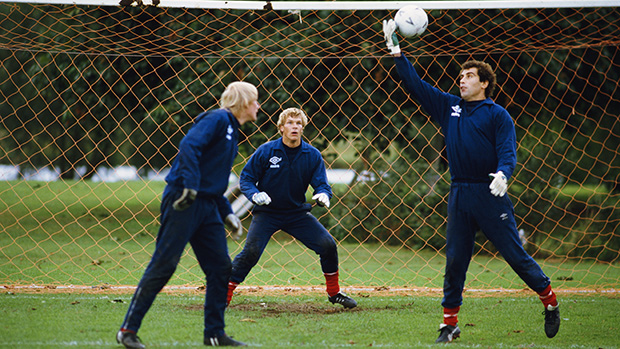
England goalkeepers (from left to right) Gary Bailey, Chris Woods and Peter Shilton pictured in training circa 1984
"Goalkeepers had to train with the other players and we used to do a lot of track running and practice matches in those days – and then maybe the goalkeepers would get to stay back with some of the players once a week to do some shooting and crossing and that would be it," he revealed/
"I remember Gordon Banks – who was at Leicester at the time – and Gordon was probably the first keeper to go back after training and do extra sessions. Basically it was shooting and crossing, but staying after training was unheard of in those days," he admitted.
It is a pertinent point given one of the key messages from last weekend’s FA Goalkeeping conference is a desire to see goalkeepers as ‘part of the team and not apart from the team’.
Another link with modern coaching trends is goalkeepers’ obsessive thirst for knowledge of where, why, when and how goals are scored.
FA lead national goalkeeping coach, Tim Dittmer, delivered a session at the conference tasking coaches to analyse a montage of recent Premier League goals and begin to consider how the huge variety of types of goals can be prevented.
"I used to sit down and write down exercises I could do, or even invent exercises based around the goals that I had conceded," explained Shilton.
"It was funny, when I was reading about Tiger Woods and it said that when he was a youngster he used to make drawings about how his different shots would go and I’d not seen that before and I was doing the same sort of thing when I was a youngster."
It was worth it. Shilton’s dedication was recognised by England at U15, youth, U23 and senior level – "I got all four he says with considerable pride. Amidst all his domestic success, playing and captaining England remains the pinnacle.
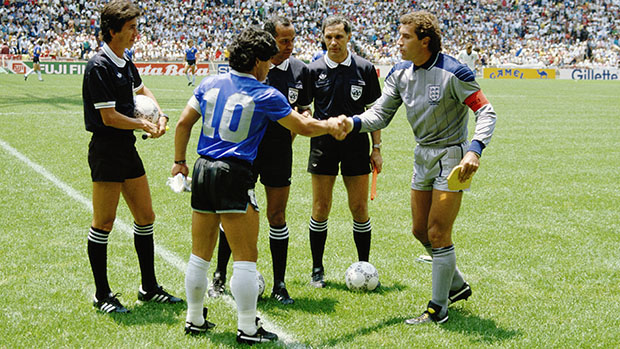
Peter Shilton shakes hands with Argentina's Diego Maradona before the 1986 FIFA World Cup Quarter-Final at the Azteca Stadium in Mexico City
"It was the ultimate for me, it was the thing that I’d always dreamed of and worked for. Once I got into the England team it just wanted to stay there as long as I could."
He did just that. As a 21-year-old he had entered into a dressing room of World Cup winners who he describes as "proper people and proper characters, always very respectful and gentlemen-like". Shilton’s record number of appearances remains unsurpassed by any other England player. However, his longevity at the elite level wasn’t left to chance.
"After one England game I remember a chap called Len Heppell writing to me, he was an self-taught ball room dancer and golfer," he said.
"Don Revie brought him into the England squad. He changed my attitude towards goalkeeping because he was very much about body movements and positions in terms of how you got best balanced.
"And I think that helped me very much, because as a goalkeeper I tended to be very much upright and my hands were a little bit rigid. He basically told me to feel as though I was in water, and get looser and you should always have your knees bent and your head forward, depending on how far the ball is from the goal.
"It’s like a dancer who comes out and he’s stiff, he can’t move, but if he comes out and he’s loose he can move and I introduced a lot of that into my game and I think that was the missing ingredient that I was looking for."
Shilton jokes that it was the best thing Don Revie did for him – after all, the former England and Leeds United managed chose Ray Clemence ahead of him as the country’s number one for a while. When talk turns to the other England managers Shilton played for, one in particular, stands out.
"For England I would say Sir Alf," he revealed.
"Don’t get me wrong I loved Bobby Robson – I played for him for eight years – but Bobby was more of a coach manager whereas Sir Alf Ramsey was really a manager. He had tremendous presence, it wasn’t what he did say, but more a case of what he didn’t say.
"People always ask me why I didn’t play for big clubs – and I had a couple of opportunities – but I always say I played for managers who I respected and who wouldn’t let me down. Because when you’re a goalkeepe,r a manager can you use you as a bit of an excuse.
"At club level I would have to say Brian Clough and Peter Taylor at Forest. I had a fantastic spell there. The thing with those two – Peter had been a goalkeeper – I knew they rated me and I also knew I could trust them.
"Cloughy had a way, where you knew he was in charge and you wanted to play for him. You wanted to please him, in a way. It was just his stature."
Given the treasure chest of silverware amassed by Shilton, Taylor and Clough whilst at the City Ground, there is the inevitable comparison with the current exploits of Claudio Ranieri’s Leicester City side. Shilton was born and bred in Leicester.
"The Forest team not only got promotion and won the league and the rest is history. But we went on to win two European Cups, two League Cups, a Super Cup and were unbeaten in 42 league games," said Shilton in Forest’s defence, before softening a little.
"As a team, Leicester have got a lot to do to emulate the Forest team. But I think if they win the league, it will be certainly on a par, and it might just be a tiny bit better – in the sense, that the way football has changed and the monopoly of the big teams, money-wise, it wasn’t quite like that with us as Forest.
"With what Leicester have spent, with the character of the team and the way they fight for the ball, within that context of the Man City’s, Man United’s, Arsenal’s and Chelsea’s, have spent fortunes and for a team like Leicester to come through and win it, it will be brilliant.
"On that one thing, the league against the league I think it might be a tiny bit better. Who knows they might go on to with the Champions League."
Before a final reminder of the way things were: "The Champions League is not the old European Cup though, which was the best of the best and probably a harder thing to win."



